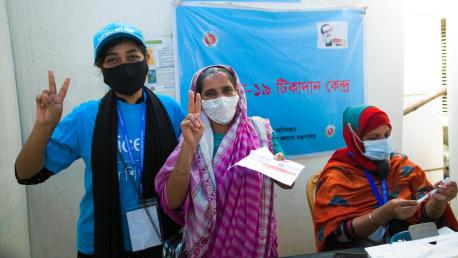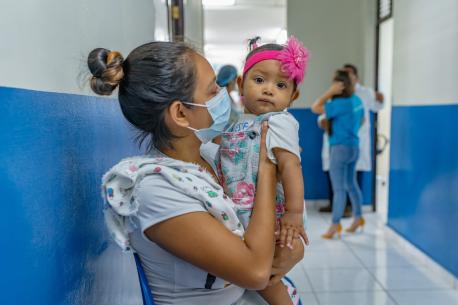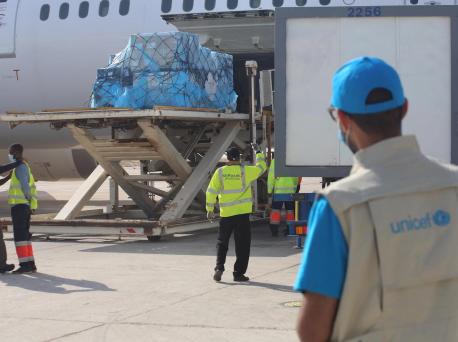
COVAX Mission Forges Ahead: Vaccinate the World Against COVID-19
A global health crisis requires a global solution. The multilateral COVAX Facility remains the best mechanism for reaching the world's poorest countries with COVID-19 vaccines.
As countries with high vaccination rates begin to see a steady decline in COVID-19 transmission rates, poorer nations are lagging far behind. The vast majority of people in developing countries — including frontline health care workers — still have not received their first shot.
"Globally, we are still in a perilous situation," warned World Health Organization Director-General Tedros Adhanom Ghebreyesus. "Yes, vaccines are reducing severe disease and death in countries that are fortunate enough to have them in sufficient quantities, and early results suggest that vaccines might also drive down transmission. But the shocking global disparity in access to vaccines remains one of the biggest risks to ending the pandemic."
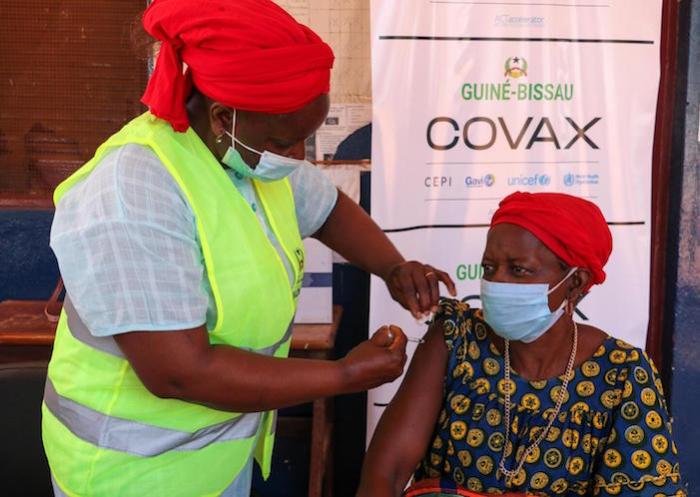
A health care worker administers a dose of COVID-19 vaccine supplied by the COVAX Facility in Guinea-Bissau on May 25, 2021. Guinea-Bissau is one of the world's poorest and most fragile countries. © UNICEF/UN0469995/
Now's the time to close the dangerous gap in vaccine coverage between rich and poor countries
In a May 31, 2021 Washington Post op/ed, Ghebreyesus joined the leaders of the International Monetary Fund, the World Bank Group and the World Trade Organization calling for a "stepped-up coordinated strategy, backed by new financing, to vaccinate the world."
The new proposal builds on the ongoing work of COVAX, the multi-agency global mechanism for equitable access to COVID-19 vaccines, a pillar of the Access to COVID-19 Tools Accelerator initiative (ACT-A). UNICEF is a key partner in COVAX and ACT-A, leading on procurement and providing on-the-ground support to prepare for and facilitate vaccine rollouts around the world.
COVAX has proven it works. Designed and implemented in the midst of an unprecedented public health crisis, it has delivered almost 93 million doses to 134 countries and economies around the world since February — from remote islands to conflict settings — managing the largest and most complex rollout of vaccines in history. More than 35 countries received their first COVID-19 vaccine doses thanks to COVAX.
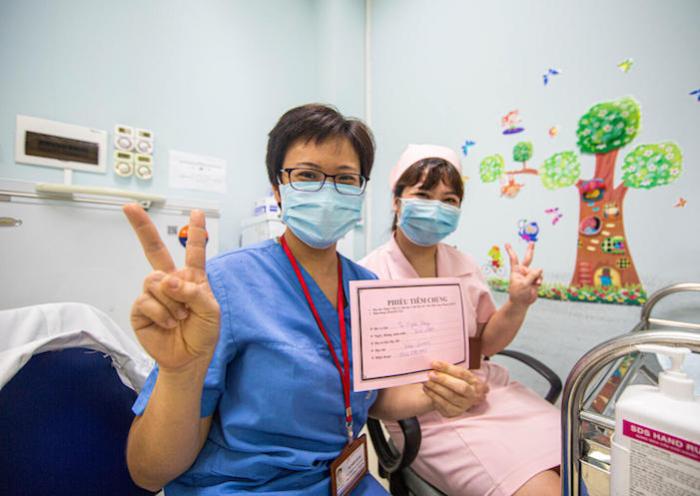
Health workers at Hanoi Medical University in Vietnam flash the "V for vaccinated" sign after receiving their COVID-19 vaccine doses through the COVAX Facility on April 26, 2021. © UNICEF/UN0451880/Le Vu
No one is safe until everyone is safe
The proposed $50 billion investment will help end the pandemic faster in the developing world, preventing the spread of deadly variants, saving lives and accelerating economic recovery, generating an estimated $9 trillion in additional global output. WHO's aim to vaccinate approximately 30 percent of the eligible population by the end of 2021 through COVAX could rise to 40 percent with the new investment, and at least 60 percent by the first half of 2022.
There is no time to lose.
"We have issued repeated warnings of the risks of letting down our guard and leaving low- and middle-income countries without equitable access to vaccines, diagnostics and therapeutics," said UNICEF Executive Director Henrietta Fore.
"We are concerned that the deadly spike in India is a precursor to what will happen if those warnings remain unheeded. While the situation in India is tragic, it is not unique. Cases are exploding and health systems are struggling in countries near – like Nepal, Sri Lanka and Maldives – and far, like Argentina and Brazil. The cost for children and families will be incalculable."
You can't vaccinate your way out of a surge
One of the consequences of India's crushing second wave is a severe reduction in vaccines available to COVAX. Soaring domestic demand for vaccines in India, a global hub for vaccine production, meant that 140 million doses intended for distribution to low- and lower-middle-income countries by COVAX through the end of May were not available. Another 50 million doses slated for June delivery are likely to be unavailable as well.
To meet that urgent need, COVAX is continuing to diversify its portfolio and channels for accessing vaccines. Advance negotiations with other vaccine manufacturers are underway. On June 2, UNICEF signed a longterm agreement with Moderna for up to 34 million doses of the vaccine for around 92 countries and territories through COVAX in 2021.
The traumatic effects of the second wave in Southeast Asia and its impact on both health care systems and global vaccine supplies underscore the need to vaccinate before a surge hits. By the time a country's case rate escalates, the same health care workers needed to administer vaccines and conduct testing and contact tracing are already working around the clock caring for those who are severely ill.
Meanwhile, as the coronavirus continues to circumnavigate the globe, the threat of dangerous variants looms. These variants may require booster shots, further straining the world's vaccine supply. The simplification of Intellectual Property Rights (IPR) through voluntary and proactive licensing by IPR holders will help pave the way for product developers and manufacturers to collaborate and innovate, increasing the scale and geographic diversity of manufacturing capacity.
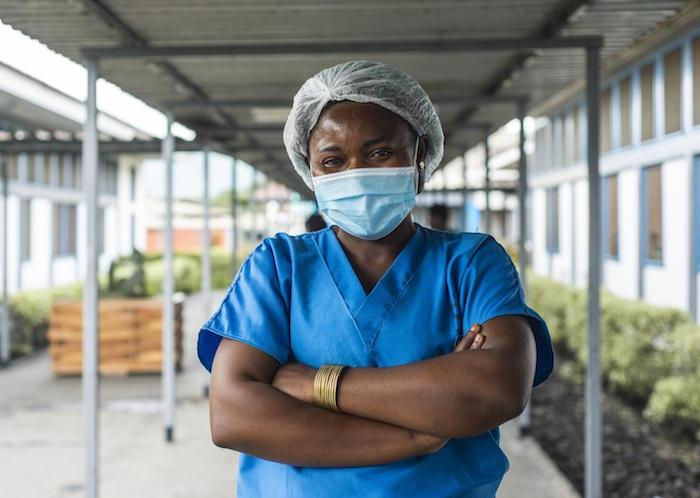
Nurse Jeanne received her COVID-19 vaccine, supplied through the COVAX initiative, in Goma, Democratic Republic of the Congo. The May 22 eruption of Mount Nyiragongo and subsequent earthquakes have displaced as many as 400,000 people — including 280,000 children — in and around Goma. © UNICEF/UN0459773/Wenga
To meet urgent demand, wealthy nations must step up and donate all available vaccine doses to developing countries
To prevent future deadly surges, wealthy nations must donate available vaccine doses to developing countries now. UNICEF analysis shows that G7 countries will soon have enough doses to donate 20 percent of their vaccines between June and August — more than 150 million doses — without significant delay to current plans to vaccinate their adult populations.
On June 3, the United States announced plans to share 80 million COVID-19 vaccine doses — 13 percent of total U.S. vaccine production — by the end of June; three-quarters of the initial 25 million doses will be donated through COVAX, prioritizing Latin America and the Caribbean, South and Southeast Asia and Africa.
In the lead-up to June's G7 Summit, UNICEF mobilized a global #DonateDosesNOW advocacy and communications campaign. On June 13, the G7 Group affirmed its support for all pillars of ACT-A and the COVAX Facility and announced pledges of at least 870 million additional COVID-19 vaccine doses, with the aim to deliver at least half by the end of 2021. This brings the full commitment by the G7 to 1 billion doses.
G7 leaders have committed to donating 1 billion COVID-19 vaccine doses
“We welcome the commitment this week by leaders of G7 nations to accelerate the rollout of safe, effective, accessible and affordable vaccines for the poorest countries, with a goal toward ending the pandemic in 2022," said UNICEF Executive Director Henrietta Fore.
"Equitable access to COVID-19 vaccines represents the clearest pathway out of this pandemic for all of us — children included, and commitments announced by G7 members last week are an important step in this direction.
“UNICEF is particularly pleased that some of the dose donations will be made available immediately to supplement ongoing shortfalls. However, time is still of the critical essence."
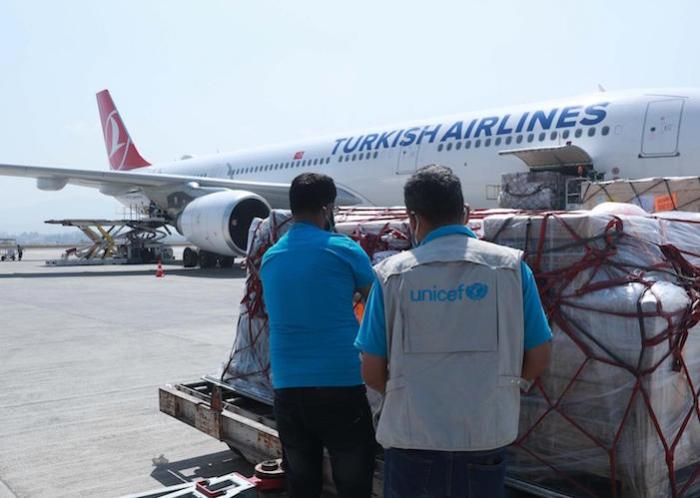
UNICEF staff oversee the delivery of Nepal's first consignment of syringes and vaccine safety boxes through the COVAX Facility at Tribhuvan International Airport in Kathmandu on March 11, 2021. © UNICEF/UN0430550
UNICEF is preparing countries so they can introduce and scale up the rollout of COVID-19 vaccines
Until vaccines are available for use, UNICEF is preparing countries so that they can introduce and then scale up the rollout of COVID-19 vaccines. As seen in the experience of high-income countries, this is a complex operation that requires resources, expertise and robust planning, including:
- pre-positioning syringes, cold chain equipment to keep vaccines at the proper temperature and protective gear including masks and gowns for vaccinators
- ensuring countries have plans to deliver the vaccines to people that are outside the scope of traditional immunization programs in low-income and lower-middle-income countries
- putting in place communication and community engagement plans to build trust in vaccines
“We have reached a grim milestone in this pandemic: There are already more dead from COVID-19 in 2021 than in all of last year," said Fore. "Without urgent action, this devastation will continue." At this historic moment, with so much at stake, UNICEF is leveraging decades of immunization expertise to help end the pandemic.
Your generous contribution can help support UNICEF 's vital role in the COVAX COVID-19 vaccine rollout around the world. Please donate today.
Top photo: A UNICEF staff member supervises the unloading of a new shipment of 31,200 additional doses of COVID-19 vaccine on April 26, 2021 at Nouakchott International Airport in Mauritania as part of the global COVAX initiative. © UNICEF/UN0451603/Lebatt. Video: Tong Su for UNICEF.
